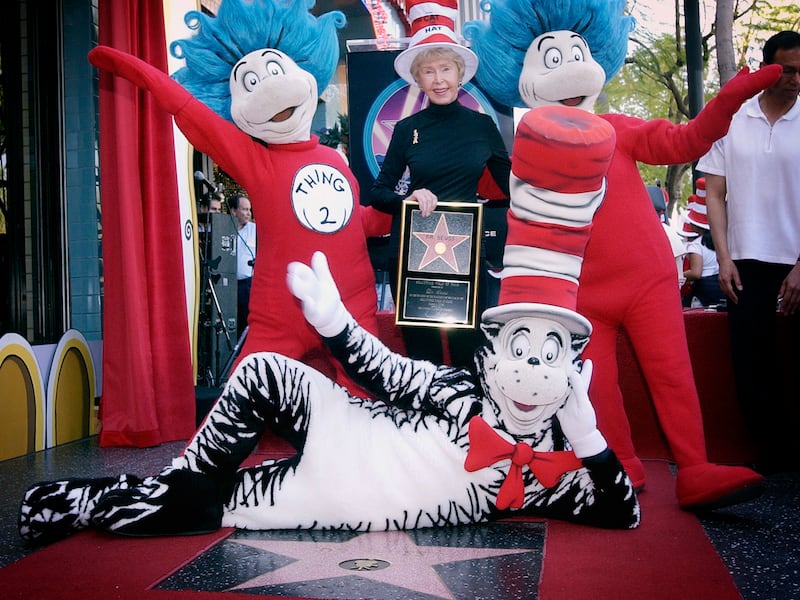It’s Dr. Seuss’s birthday, which also makes it Read Across America Day. To most, Dr. Seuss — real name Theodor Seuss Geisel — is an author of childhood books that have deeper messages embedded within. They’re books about where you will go, an odd breakfast with green eggs, a feline that might one day wear a fedora, and a green dude who steals Christmas.
But Dr. Seuss meant more to me and the people I grew up with in Massachusetts. He took on a persona similar to other legendary figures from the New England area. It’s no question that New England — especially Massachusetts and its capital city Boston — have a way of immortalizing its heroes from pop culture, sports and literature.
Dr. Seuss — with a museum in Springfield, Mass. — was someone you always grew up learning and reading about, putting him on the same shelf as Tom Brady, Larry Bird, Emily Dickinson, Julius “Dr. J” Erving and so many other major figures from Massachusetts.
The persona was that of a legend. He was one of the cultural heroes of the Massachusetts area, one you always spoke of and heard about. It helped that the Dr. Seuss Museum was a quick trip down I-90, and it was often the location of school field trips and Saturday morning adventures with the family. As with the game of basketball and volleyball, Dr. Seuss was a cultural figure Massachusetts could tout — the way Utah celebrates its pioneer history. These are historic figures whose origin stories started in the Bay State.
But it wasn’t until after I left Massachusetts that I understood more about him. The books were still vastly interesting. But I met fewer and fewer people who read his work. They might have heard of “How the Grinch Stole Christmas,” but that’s one of those cultural works that you just can’t forget. “Cat in the Hat” is still recognizable and “Green Eggs and Ham” gets a shout here and there. But the praise, reverence and celebration for the character were so limited elsewhere that I almost forgot about him.
Recently, Dr. Seuss has popped up in the news as a victim of cancel culture. As NPR reports, his books have been criticized for having racist undertones. For example, “And To Think That I Saw It On Mulberry Street” has a character who is “described as Chinese has two lines for eyes, carries chopsticks and a bowl of rice, and wears traditional Japanese-style shoes,” according to NPR.
Similarly, “If I Ran the Zoo” has two male characters who are “said to be from Africa” and “are shown shirtless, shoeless and wearing grass skirts as they carry an exotic animal.”
“Outside of his books, the author’s personal legacy has come into question, too — Seuss wrote an entire minstrel show in college and performed as the main character in full blackface,” according to NPR.
This new information led to the National Education Association to rebrand Read Across America in 2017 to embrace diverse authors instead of Seuss, NPR reported.
Those of us who grew up around him and looked up to him have been challenged with new information about his legacy. And as an adult, someone your world celebrated is no longer considered a shining star. So you move on. You go somewhere else.
Every now and again, you’ll walk through the book aisle of Walmart or Smith’s and you’ll see one of his books. Sometimes I’ll sift through old boxes and find “All the Places You Will Go” gathering dust. The book has long been given out as a graduation gift, acting as a symbol of your transition from childhood to adulthood.
It’s funny that the places we go are taking us far away from Dr. Seuss. And I don’t see that ending anytime soon. We, as a culture, will drift farther away this famous writer.
In a way, Dr. Seuss has been a symbol of my journey from boyhood to adulthood — a marker of the journey from naiveté to a full understanding and knowledge (though don’t get me wrong, I’m sophomoric at best). Now, we are more aware, and educators will continue to question some of the content in his books. Society will have to face questions about Seuss’ work for years to come.
For me, growing up, he was an example of where we will go and what we will experience in life. He was the wise voice to a confused child.
Now, he’s a reminder of the past — a figure who shall live in the back of our minds and remain there like a distant memory. If there’s anything to learn from Dr. Seuss, it’s that we all grow up and find our own places to go.


